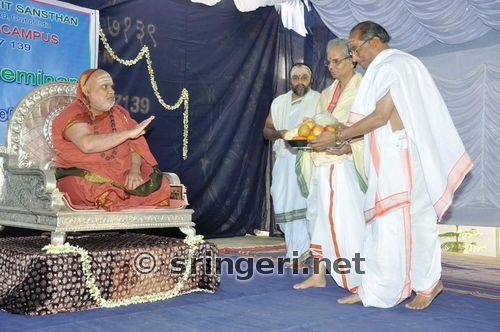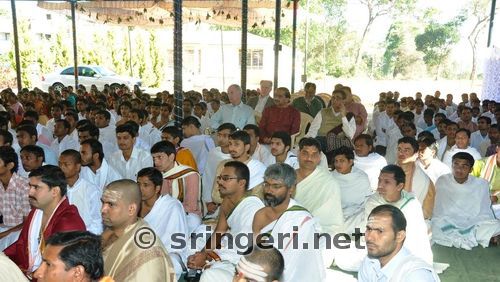Jagadguru inaugurates International Seminar

On January 16 2012, Jagadguru Shankaracharya Sri Sri Bharati Tirtha Mahaswamiji inaugurated the 3-day International Seminar on Contribution of Sanskrit to Development of World Thought organized by the Rajiv Gandhi Vidya Peetham, the Sringeri Campus of the Rashtriya Samskrita Samsthan at Sringeri. The Jagadguru was reverentially welcomed by the Vice-Chancellor of the Samsthan, Prof. Radhavallabh Tripati and the Principal of the Sringeri Campus, Prof. Vempati Kutumba Sastry. Having inaugurated the conference, the Jagadguru in His Sanskrit Anugraha Bhashanam said that innumerable works have been written in Sanskrit – the Devabhasha – the language of the gods. Though thousands of works are available today, many more have been lost due to various reasons. However, it is possible to attain immense knowledge across diverse fields by studying works that are available.

One of the Nyaya Sutras of Akshapada (Sage Gautama) is प्रत्यक्ष-अनुमान-उपमान-शब्दाःप्रमाणानि (the instruments of knowledge are direct perception, inference, comparison and word). A work called Tattva Chintamani containing 10,000 verses was written to describe these four Pramaanaas (instruments of knowledge). Hundreds of commentaries and sub-commentaries had been subsequently written on this work.
One can imagine the total number of works that exist, and the extent of analysis involved if so many works were written to explain one aspect of a single subject.
One of the Mimamsa Vartikas of Sri Kumarila Bhatta goes विधिरत्यन्तम् अप्राप्ते नियमः पाक्षिकेसति । तत्र चान्यत्र च प्राप्तौ परिसंख्येति गीयते ।। In order to explain this Vartika, Sri Appayya Deekshita wrote a work called “Vidhi Rasaayanam” – Today, it is difficult to find anyone who has the qualification to even study this work (let alone attain proficiency in it). Such was the sophisticated thought processes of our predecessors that they went to such great depths to explain even a single aspect of the Shastras. One can also notice that they did not leave any leaf unturned when analyzing the import of the Shastras. Though they had respect for the writers of the earlier works, they analyzed them critically with sharp logic.
For instance, Gadadhara Bhattacharya who commented on the Didhiti commentary of Tattva Chintamani express great respect for the author of Didhiti in his commentary. Yet there are areas where his view differed from that of the author of Didhti. When asked how he could justify such differences in view from the work he was commenting, he explains न हि कस्यचिद्ग्रन्थकृतो विपरीतलेखनं युक्तिबलाद् वस्तुसिद्धौ बाधकं भवति । (an inappropriate argument put forth by anyone does not stand in the way of the right conclusion arrived at by the use of proper logic).
In case of such logical analysis, it is very essential to have in mind the objective or the conclusion. This conclusion cannot be arbitrary and must conform with the Vedas. Indeed, this has been emphasized by Sage Badarayana in His Brahma Sutras (तर्काप्रतिष्ठानात्) and by Sri Adi Shankara Bhagavatpada (वाक्यार्थश्च विचार्यतां श्रुतिशिरःपक्षः समाश्रीयताम् दुस्तर्कात् सुविरम्यतांश्रुतिमतस्तर्कोऽनुसन्धीयताम्). Hence everyone who wishes to analyze philosophical concepts has to bear this in mind. What purpose is served if one otherwise concludes in favor of Shunyavada (nihilism). What is the use of such analysis? Hence use your logic to understand the purport of the Vedas.
Sri Appayya Dikshita in Vidhi Rasaayanam analyses the verse of the Vartika-kara (Sri Kumarila Bhatta) and raises several objections that a critical analysis can bring forth. Ultimately he himself puts forth answers to these objections, and concludes that the verse is indeed apt. Though he knew the verse was apt, the analysis was done to systematically clarify objects and prove its aptness. Such is the analyzing procedure one must adopt keeping in mind the established conclusion in the Vedas.
Taking note of the presence of many foreign scholars of Sanskrit during the conference, the Jagadguru mentioned that scholars from all over the globe were present along with scholars from India on the occasion because of their love and respect for Sanskrit.
The Jagadguru then spoke about the book released on the occasion – a book titled “Tattva Chandrika” written a century ago by Sri Uma Maheshwara Shastri. The Jagadguru mentioned that the book had been originally printed in Telugu script and at His behest, Prof. Vempati Kutumba Shastri and Prof. Radha Vallabh Tripati had taken up its publication and had readied it for released on this occasion. The Jagadguru commended them for their effort and blessed the delegates of the conference for success.
